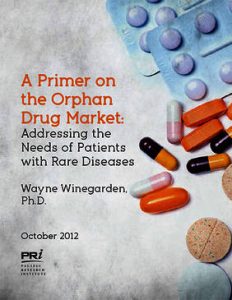PRI RELEASES PRIMER ON ORPHAN DRUG MARKET
BENEFITS FROM ORPHAN DRUG RESEARCH OUTWEIGH COSTS
 A new study from the Pacific Research Institute reviews the economics of the orphan drug market and determines that the benefits from continued orphan drug research outweigh the costs. The report A Primer on the Orphan Drug Market, by Dr. Wayne Winegarden, PRI Senior Fellow, concludes that while improvements can (and should) be made, the current public-private relationship creates an efficient division of labor in that the government sector lowers certain specific government-created costs of drug development and provides researchers a longer period to recoup their development costs.
A new study from the Pacific Research Institute reviews the economics of the orphan drug market and determines that the benefits from continued orphan drug research outweigh the costs. The report A Primer on the Orphan Drug Market, by Dr. Wayne Winegarden, PRI Senior Fellow, concludes that while improvements can (and should) be made, the current public-private relationship creates an efficient division of labor in that the government sector lowers certain specific government-created costs of drug development and provides researchers a longer period to recoup their development costs.
Dr. Winegarden adds: current policy compensates for the problems of scale that limit the ability of researchers to sustainably engage in orphan drug research efforts. As a result, private sector firms are able to undertake research on orphan drugs and attempt to help the 25 million Americans afflicted with a rare disease.
In the United States, rare diseases are defined as diseases that afflict a small percentage of people. Currently, there are 6,000 to 8,000 diseases categorized as rare, affecting 7 percent of the U.S. population. Therefore, the societal impact from rare diseases is large even though the impact from each rare disease is small.
Pharmaceutical drugs developed to cure or treat rare diseases are referred to as orphan drugs. The fundamental economic problem facing orphan drugs is scale. The average costs of developing an orphan drug is not less expensive than the average costs for developing non-orphan pharmaceutical drugs, but the potential population that can benefit is significantly smaller. Additionally, this smaller population can actually increase developmental costs as there are also fewer potential trial participants. Ultimately, investment incentives created by the ordinary patent system for pharmaceutical development are inadequate. In an effort to increase the development of pharmaceutical drugs for rare diseases, the Orphan Drug Act on 1983 (ODA) was established to further support the research and development of these orphan drugs with a goal to increase the number of therapies available to people with rare diseases.
